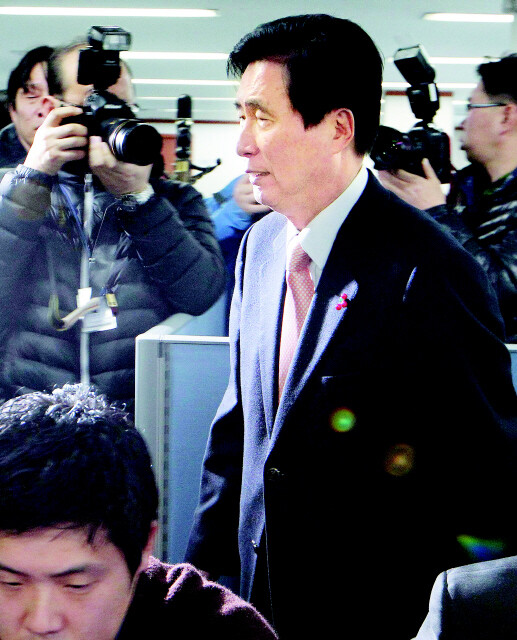hankyoreh
Links to other country sites 다른 나라 사이트 링크
GNP Supreme Council members criticize budget railroading

By Seong Yeon-cheol
Ko Heung-kil stepped down as Grand National Party (GNP) Policy Committee Chairman Sunday, saying that he bore “full responsibility” for necessary items such as temple-stay funding being left out of the 2011 budget railroaded through the National Assembly. But many within the GNP are calling for a resignation of the party leadership that led the charge to railroad the budget, contending that the issue “is not something that will be resolved by the policy committee chairman’s resignation.”
During a telephone interview with the Hankyoreh on Sunday, GNP Supreme Council member Hong Joon-pyo said that popular sentiment had become grim due to factors such as the budget railroading.
“This is not something that Ko’s resignation will fix,” Hong added.
Another Supreme Council member, Chung Doo-un, called it “an episode that clearly shows the leadership vacuum in the party.”
“When I think about the coming election, it does not look likely that it will be Chairman Ahn Sang-soo’s system,” Chung added.
Both Hong and Chung declined to participate in a Dec. 9 Supreme Council meeting, expressing discomfort with the party’s decision to railroad the 2011 budget through at an early date.
Calls for a reshuffling of the party leadership are also emerging from among first-term and junior lawmakers.
“When I saw Ahn saying at the party’s general meeting following the budget railroading that he ‘saw the budget getting passed and thought there was hope for the GNP,’ it seemed pathetic to me,” said a first-term lawmaker from the Seoul area.
“The solution of achieving a turnaround by sentencing the policy committee chairman alone to ‘death’ is too far removed from public sentiment,” the lawmaker added. “The only solution is a reshuffling of the party leadership, including the chairman.”
Ahn, who announced a platform of “70 percent welfare,” has been accused of focusing solely on working for his local constituency without concern for how the budget he pledged is being arranged. He only moved to belatedly take care of the policy committee chairman and Ministry of Strategy and Finance administrators after budget items were omitted for the expansion of the child care allowance, temple stays, and an east-west express train between Chuncheon and Sokcho.
Observers also say that floor leader Kim Moo-sung, who oversees floor policy, should take responsibility for not only disregarding National Assembly politics but also creating a major burden for governance due to deteriorating public opinion by insisting on his goal of passing the budget within the regular session.
“Ever since he assumed his position, he has been a constant source of worry, lacking finesse to match his boldness,” a key party official said. Kim’s own position is in jeopardy with the resignation of Ko, who formed a pair with him when he ran for floor leader.
Ko, who attached major importance to the Four Major Rivers Restoration Project budget, an item of Cheong Wa Dae (the presidential office in South Korea or Blue House) interest and subject to nationwide protests, was accused within the party of lacking expertise as policy committee chairman and being passive with regard to the wishes of the Cheong Wa Dae. Critics have also had tough words to say about Special Committee on Budget and Accounts Chairman Lee Ju-young, who managed a 40 billion Won ($35 million) budget increase for his own constituency while failing to arrange pledged funds for other areas such as welfare and Buddhism.
Please direct questions or comments to [englishhani@hani.co.kr]
Editorial・opinion
![[Column] Season 2 of special prosecutor probe may be coming to Korea soon [Column] Season 2 of special prosecutor probe may be coming to Korea soon](https://flexible.img.hani.co.kr/flexible/normal/500/300/imgdb/original/2024/0426/3317141030699447.jpg) [Column] Season 2 of special prosecutor probe may be coming to Korea soon
[Column] Season 2 of special prosecutor probe may be coming to Korea soon![[Column] Park Geun-hye déjà vu in Yoon Suk-yeol [Column] Park Geun-hye déjà vu in Yoon Suk-yeol](https://flexible.img.hani.co.kr/flexible/normal/500/300/imgdb/original/2024/0424/651713945113788.jpg) [Column] Park Geun-hye déjà vu in Yoon Suk-yeol
[Column] Park Geun-hye déjà vu in Yoon Suk-yeol- [Editorial] New weight of N. Korea’s nuclear threats makes dialogue all the more urgent
- [Guest essay] The real reason Korea’s new right wants to dub Rhee a founding father
- [Column] ‘Choson’: Is it time we start referring to N. Korea in its own terms?
- [Editorial] Japan’s rewriting of history with Korea has gone too far
- [Column] The president’s questionable capacity for dialogue
- [Column] Are chaebol firms just pizza pies for families to divvy up as they please?
- [Column] Has Korea, too, crossed the Rubicon on China?
- [Correspondent’s column] In Japan’s alliance with US, echoes of its past alliances with UK
Most viewed articles
- 1‘We must say no’: Seoul defense chief on Korean, USFK involvement in hypothetical Taiwan crisis
- 2Is Japan about to snatch control of Line messenger from Korea’s Naver?
- 3No good, very bad game for Korea puts it out of Olympics for first time since 1988
- 4Samsung subcontractor worker commits suicide from work stress
- 5[Editorial] Korea’s surprise Q1 growth requires objective assessment, not blind fanfare
- 6Division commander ordered troops to enter raging flood waters before Marine died, survivor says
- 7N. Korean delegation’s trip to Iran shows how Pyongyang is leveraging ties with Moscow
- 8Korea’s 1.3% growth in Q1 signals ‘textbook’ return to growth, says government
- 9Flying “new right” flag, Korea’s Yoon Suk-yeol charges toward ideological rule
- 10[Column] Park Geun-hye déjà vu in Yoon Suk-yeol